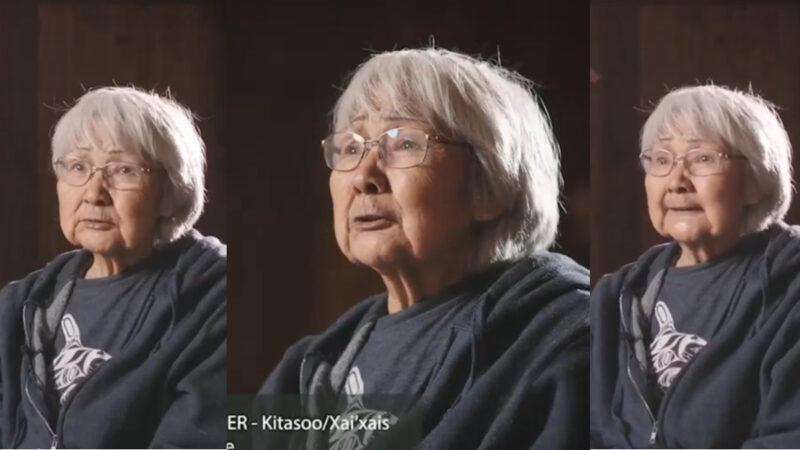Ruth Robinson, Elder – Kitasoo/Xai’xais
“What are my people going to do? How are they going to work, cause there are no other jobs here too.“
Ruth Robinson, Elder – Kitasoo/Xai’xais
Viewpoint By: Sam B McLeod
Seawestnews
Elders like Ruth Robinson are rightfully concerned for their people.
If the decision to forcibly remove salmon farms from First Nations waters in BC, leaving it with no other employment or revenue opportunities to replace the sector, communities like Klemtu will be devastated,
Kitasoo Seafoods LP has been operating since 1986 managing and/or fishing several wild seafood commercial fishing licenses. This is a company that straddles both wild and farm industries with wisdom and pragmatism, or pragmatic wisdom. Whichever way it is described it is evident the community’s focus is based on environmental harmony and longevity.
Kitasoo seafoods holds six salmon farm tenures – on behalf of the community – that are currently leased and operated by Mowi Canada West through an agreement that ensures the fish processing plant and fish farms employ a vast majority of locals. They have a protocol agreement in place that has strict environmental sustainability requirements, and includes significant independent environmental monitoring by Kitasoo Fisheries (over and above monitoring provided to other government agencies) regarding:
- Sea lice levels on wild salmon.
- Contaminant sampling of wild resources used by locals.
- Biodiversity impacts near farms.
Continued operations by Mowi Canada West depend on environment performance of the farms to the stringent standards of Kitasoo/Xai’xais Nation.
Through their collaboration with Mowi Canada West, Kitasoo Seafoods has grown and thrived.
The business now have two fishing vessels, 100% owned and operated by themselves. The vessels are Island Joye I, and Western Princess, which pack salmon from farm sites to the fish processing plant in Klemtu. One other vessel, Western Pacific, is a joint venture with Canadian Fishing Company. That vessel fishes for wild salmon and herring.
There are also two separately registered processing plants in Klemtu, again 100% owned and operated by Kitasoo Seafoods. The first processes farmed salmon from the six farm sites in Kitasoo/Xai’xais territory and provides full time employment for 6-9 months of the year. The second plant processes wild seafoods, currently sea cucumber and herring roe on kelp.
Then, being fortunate enough to have access to an abundance of fresh salmon a new business was born, where 90% of employees are from First Nations communities.
Klemtu Spirit Hot Smoked Atlantic Salmon, which is brined and smoked in a traditional west coast way at a processing plant is now exclusively available at over 330 Walmart stores.
Unfortunately, due to the Discovery Islands farmed salmon shortfall, the brand, which produces Hot Smoked Atlantic Salmon for First Nation Walmart contract, does not currently have fish to process.
All this devastation is purely the result of rabid anti-salmon farmers rhetoric, spewing from the mouths of elites in their pursuit of robbing coastal communities of relevant job opportunities.
It has been proven time and time again that coastal communities are never at the forefront of federal government’s decisions to improve quality of life.
Quality of life seems to be a conversation reserved for rich urban areas. Meanwhile coastal First Nations communities are largely forgotten by the country’s leaders – or remembered in a romanticised fashion of a people who need no land nor water, only a strong connection to Creator.
The harsh truth is poverty stinks, poverty is not romantic, it takes a toll on mental health, poverty starves out people, poverty kills the soul.
When Ruth ends that video with “I love you Kitasoo!”, I heard not only the love she has for her community, but I also heard the fear she holds in her heart for her community’s survival. Ruth’s soul is scarred with the memories of depression and suicides of her community in the before times. She knows what a lack of autonomy combined with a lack of valuable work can do to her people.
Ruth Robinson, Elder, Kitasoo/Xai’xais Nation, is speaking out because this is no longer a time to survive. It is her given right to thrive.
Please watch the video.
Image – screenshots of Ruth Robinson, taken from the Facebook video

